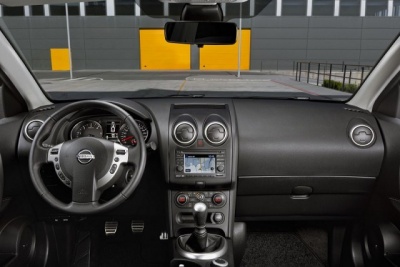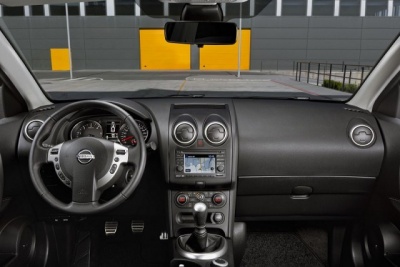Nissan has unveiled what it claims to be the world's first digitally-controlled 'drive-by-wire' steering system. Instead of a mechanical connection between steering wheel and front wheels, Nissan's system uses a bunch of clever electronics that transmit driver steering input from the wheel to a myriad of electronic brains and finally onto the wheels themselves.
According to Nissan the system can transmit driver input to the wheels much faster, theoretically improving steering response, 'and increasing the direct driving performance feel by quickly and intelligently communicating road surface feedback to the driver', or in other words throwing in some fake 'feedback'. The 'drive-by-wire' (or should that be steer by wire? - answers on a postcard) system is in the advanced stages of development and could make its way into road going cars within a year apparently. This is all well and good but I have one word for Nissan and any other manufacturer who is currently developing such a system:
STOP!
Call me a purist but I like to know that there is a physical connection between the steering wheel I hold in my hand and the wheels at the front of the car. This is not from any sort of 'driving god' viewpoint either; lord knows I am not the best driver in the world (Shane will attest to that), but I worry about the safety of the system.
Over the past few years more and more manufacturers, in the name of fuel economy, have moved towards electromechanical steering systems rather than the hydraulic systems of old. But there is still a physical connection - it is the mechanical bit of the electromechanical name. With the Nissan system this is wiped out.
Now Nissan says that should one of the many control units fail, another immediately takes over from it, and if the catastrophic happens and the entire thing collapses a clutch is engaged that physically links the steering wheel to the wheels in the old-fashioned way. At least that is something.
However, my safety concerns go beyond the complete failure of the system resulting in a fiery death. In fact they are much more simplistic than that.
The Nissan also uses a forward facing camera to read the road ahead and take evasive action should it detect an imminent accident. Nothing new there then, such systems are now becoming the norm, but combined with the steering and a whole host of other 'safety' features it does somewhat make the driver redundant.
And this brings me back to the 'purist' bit; once you learn to drive, how a car handles and feels eventually becomes second nature and it is this skill set that prevents more accidents than anything else. For every accident avoided by active safety systems there are dozens more avoided by the driver simply paying attention and calling upon experience to steer away from danger.
If systems like these become the norm the driver will be so accustomed to them and anesthetised to the sensation of actually driving that they will learn to rely on them. Imagine for a moment if your parents bought a Nissan Qashqai outfitted with a whole host of fancy safety gizmos and became used to its drive. Then imagine they needed to borrow your 'old fashioned' car to nip to the shops - they would be dead before they got around the corner. And don't even get me started on my kids, who will probably grow up knowing nothing other than these ultra-safe cars. There is not a hope in hell that in thirty years' time they will be allowed behind the wheel of my decrepit, unsafe old BMW M3.


